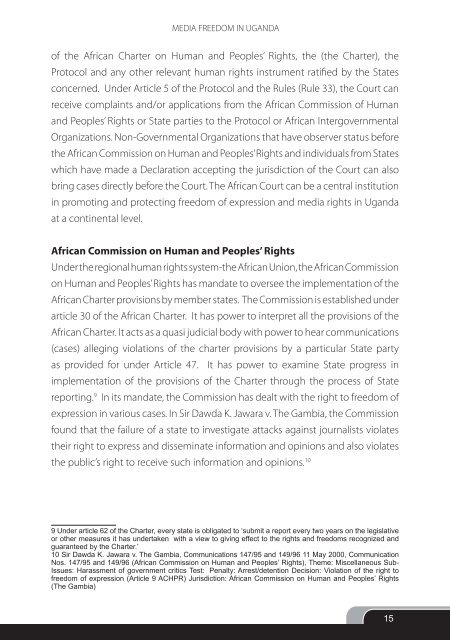Media_Freedom_in_Uganda_Analysis_of_inequitable_legal_limitations
Media_Freedom_in_Uganda_Analysis_of_inequitable_legal_limitations
Media_Freedom_in_Uganda_Analysis_of_inequitable_legal_limitations
Create successful ePaper yourself
Turn your PDF publications into a flip-book with our unique Google optimized e-Paper software.
MEDIA FREEDOM IN UGANDA<br />
<strong>of</strong> the African Charter on Human and Peoples’ Rights, the (the Charter), the<br />
Protocol and any other relevant human rights <strong>in</strong>strument ratified by the States<br />
concerned. Under Article 5 <strong>of</strong> the Protocol and the Rules (Rule 33), the Court can<br />
receive compla<strong>in</strong>ts and/or applications from the African Commission <strong>of</strong> Human<br />
and Peoples’ Rights or State parties to the Protocol or African Intergovernmental<br />
Organizations. Non-Governmental Organizations that have observer status before<br />
the African Commission on Human and Peoples’ Rights and <strong>in</strong>dividuals from States<br />
which have made a Declaration accept<strong>in</strong>g the jurisdiction <strong>of</strong> the Court can also<br />
br<strong>in</strong>g cases directly before the Court. The African Court can be a central <strong>in</strong>stitution<br />
<strong>in</strong> promot<strong>in</strong>g and protect<strong>in</strong>g freedom <strong>of</strong> expression and media rights <strong>in</strong> <strong>Uganda</strong><br />
at a cont<strong>in</strong>ental level.<br />
African Commission on Human and Peoples’ Rights<br />
Under the regional human rights system-the African Union, the African Commission<br />
on Human and Peoples’ Rights has mandate to oversee the implementation <strong>of</strong> the<br />
African Charter provisions by member states. The Commission is established under<br />
article 30 <strong>of</strong> the African Charter. It has power to <strong>in</strong>terpret all the provisions <strong>of</strong> the<br />
African Charter. It acts as a quasi judicial body with power to hear communications<br />
(cases) alleg<strong>in</strong>g violations <strong>of</strong> the charter provisions by a particular State party<br />
as provided for under Article 47. It has power to exam<strong>in</strong>e State progress <strong>in</strong><br />
implementation <strong>of</strong> the provisions <strong>of</strong> the Charter through the process <strong>of</strong> State<br />
report<strong>in</strong>g. 9 In its mandate, the Commission has dealt with the right to freedom <strong>of</strong><br />
expression <strong>in</strong> various cases. In Sir Dawda K. Jawara v. The Gambia, the Commission<br />
found that the failure <strong>of</strong> a state to <strong>in</strong>vestigate attacks aga<strong>in</strong>st journalists violates<br />
their right to express and dissem<strong>in</strong>ate <strong>in</strong>formation and op<strong>in</strong>ions and also violates<br />
the public’s right to receive such <strong>in</strong>formation and op<strong>in</strong>ions. 10<br />
9 Under article 62 <strong>of</strong> the Charter, every state is obligated to ‘submit a report every two years on the legislative<br />
or other measures it has undertaken with a view to giv<strong>in</strong>g effect to the rights and freedoms recognized and<br />
guaranteed by the Charter.’<br />
10 Sir Dawda K. Jawara v. The Gambia, Communications 147/95 and 149/96 11 May 2000, Communication<br />
Nos. 147/95 and 149/96 (African Commission on Human and Peoples’ Rights), Theme: Miscellaneous Sub-<br />
Issues: Harassment <strong>of</strong> government critics Test: Penalty: Arrest/detention Decision: Violation <strong>of</strong> the right to<br />
freedom <strong>of</strong> expression (Article 9 ACHPR) Jurisdiction: African Commission on Human and Peoples’ Rights<br />
(The Gambia)<br />
15


